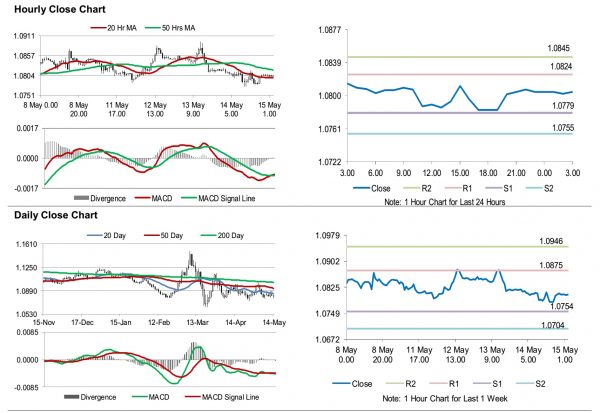For the 24 hours to 23:00 GMT, the EUR declined 0.12% against the USD and closed at 1.0804.
On the macro front, Germany’s consumer price inflation slowed to 0.9% on a yearly basis in April, recording its lowest level since November 2016 and compared to a level of 1.4% in the previous month. The preliminary figures had indicated a level of 0.8%.
In the US, the initial jobless claims fell to a level of 2981.0K in the week ended 08 May 2020, less than market expectations for a drop to a level of 2500.0K and compared to a revised level of 3176.0K in the previous month.
In the Asian session, at GMT0300, the pair is trading at 1.0804, with the EUR trading flat against the USD from yesterday’s close.
The pair is expected to find support at 1.0779, and a fall through could take it to the next support level of 1.0755. The pair is expected to find its first resistance at 1.0824, and a rise through could take it to the next resistance level of 1.0845.
Moving forward, traders would keep a watch on Euro-zone’s trade balance for March and gross domestic product (GDP) for 1Q 2020, slated to release in a few hours. Additionally, Germany’s producer price index for April and GDP for 1Q 2020, will also be eyed by traders. Later in the day, the US NY Empire State manufacturing index and the Michigan consumer sentiment index, both for May, along with retail sales and industrial production, both for April, would keep investors on their toes keep investors. Also, US business inventories and the JOLTS job openings, both for March, would garner significant amount of investor attention.
The currency pair is showing convergence with its 20 Hr moving average and trading below its 50 Hr moving average.

